Single-cell Sequencing Service
Single-cell sequencing is a cutting-edge technology that enables the analysis of genomic, transcriptomic, and epigenomic information at the level of individual cells. Unlike bulk sequencing, which provides averaged data from a population of cells, single-cell sequencing captures the unique molecular characteristics of each cell, revealing cellular heterogeneity and rare cell populations. Single-cell sequencing begins with the isolation of target tissues, followed by the use of cell separation techniques to obtain individual cells. DNA or RNA is then extracted from the single cells and amplified to construct sequencing libraries. High-throughput sequencing is subsequently performed on the single-cell libraries to generate sequencing data. After sequencing, the data is organized and aligned to produce single-cell-level genomic or transcriptomic expression profiles, which are further analyzed to reveal the molecular characteristics and related information of each cell.
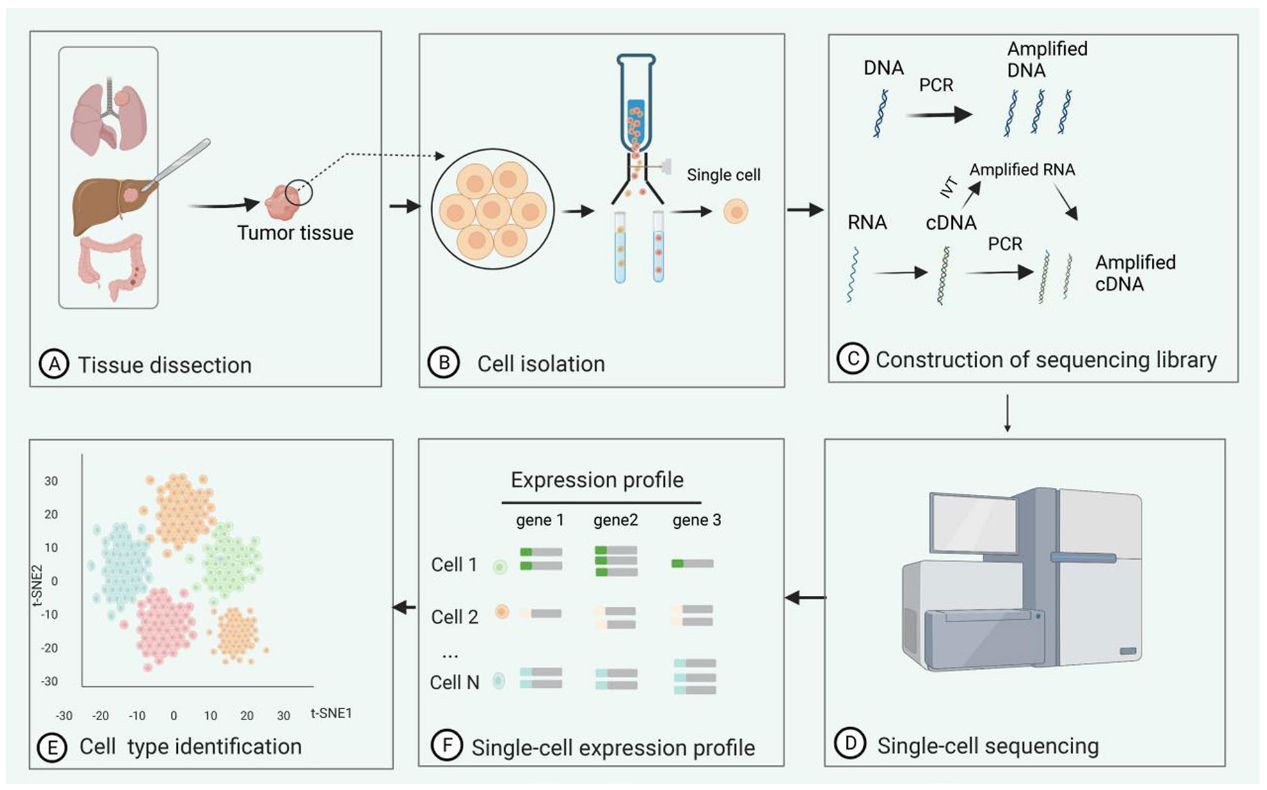
Han, Y. et al. J Hematol Oncol. 2022.
Figure 1. Schematic Diagram of Single-Cell Sequencing
Single-cell sequencing is essential for understanding complex biological systems, as it provides deep insights into cellular differentiation, development, and disease progression. It is particularly suitable for studying heterogeneous tissues, uncovering gene expression dynamics, and identifying cellular subpopulations that drive disease processes. It addresses the limitation of bulk analysis, where rare or unique cell types are masked, allowing researchers to explore critical mechanisms in cancer, immune responses, and stem cell biology.
Services at MtoZ Biolabs
MtoZ Biolabs relies on advanced sequencing platforms to provide comprehensive single-cell sequencing service covering cell sorting library construction sequencing and data processing ensuring efficient transitions and high-quality outputs from sample to data. The laboratory is equipped with state-of-the-art instruments such as the Illumina NovaSeq 6000 and 10x Genomics Chromium system meeting diverse sample types and research requirements. Our team consists of experienced experts in single-cell sequencing and data analysis mastering a wide range of single-cell technologies and bioinformatics tools offering reliable data support and customized solutions. MtoZ Biolabs maintains strict quality control processes and efficient technical platforms supporting precise sequencing analysis of complex samples.
Service Advantages
1. Comprehensive Coverage of Single-Cell Omics
Single-cell sequencing service at MtoZ Biolabs enable a wide array of applications, including genome, transcriptome, and epigenome analysis at the single-cell level by providing tools to study chromatin accessibility, DNA methylation, 3D genome architecture, and histone modifications for deeper insights into cellular functions and regulatory mechanisms.
2. Cutting-Edge Technologies for Advanced Research
Single-cell sequencing service integrates spatially resolved transcriptomics and third-generation sequencing platforms to deliver high-resolution profiling of cellular heterogeneity and tissue organization while supporting the exploration of complex biomedical systems through precise and reliable data.
3. Expertise in Tailored Solutions
MtoZ Biolabs leverages its extensive expertise to deliver customized single-cell sequencing service that addresses specific research challenges by providing reliable results and supporting advanced studies in areas such as stem cell biology and disease modeling.
Case Study
1. Single-cell Sequencing Reveals Processes Involved in Ovarian and Breast Cancers
This study investigates single-cell genomic variation induced by mutational processes in cancer. Using single-cell sequencing, the research analyzes genomic instability and mutational patterns across various cancer types, including point mutations and copy number variations (CNVs). The findings highlight intratumoral and intercellular genomic heterogeneity and the role of specific mutational processes in cancer progression. This study provides new perspectives on the mechanisms of genomic variation in cancer and lays the foundation for developing personalized therapeutic strategies. Single-cell sequencing service offers advanced solutions for studying genomic variation at the single-cell level, supporting research into cellular heterogeneity and underlying mutational processes.
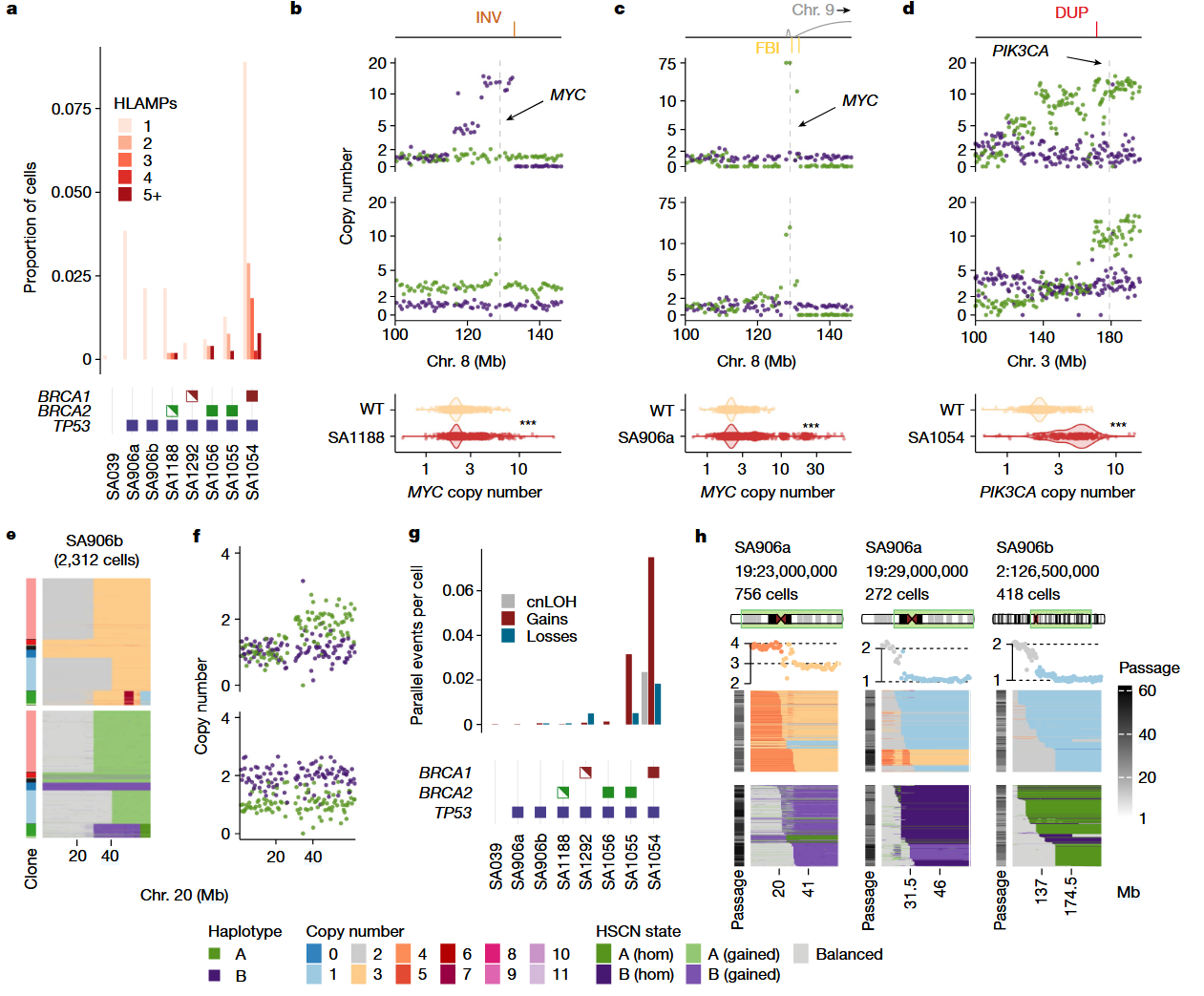
Funnell, T. et al. Nature. 2022.
Figure 2. Single-cell Sequencing Reveals Genomic Heterogeneity, Clonal Dynamics, and Copy Number Variation (CNV) Profiles in Cancer Cells
2. Single-cell Sequencing Unravels Biology and Shifting Paradigms in Cancer
Single-cell sequencing technology has various applications in lung cancer research, including heterogeneity analysis and the study of rare tumor cell populations. Through single-cell RNA sequencing, it is possible to identify cell types in lung tissue and their associated biomarkers, as well as construct correlation matrices of gene expression. Single-cell genome sequencing combined with lineage tracing can analyze the genetic characteristics of tumor evolution, revealing subtype switching and its association with therapeutic resistance. Additionally, single-cell RNA sequencing of cells collected via bronchial lavage can detect early signs of malignant transformation. Single-cell genome sequencing of circulating tumor cells (CTCs) can identify cancer subpopulations with distinct phenotypes. These applications provide critical scientific evidence for the precision treatment of lung cancer. Single-cell sequencing service provides powerful tools to study cellular diversity and tumor evolution, offering a solid foundation for advancing research in cancer biology and precision medicine.
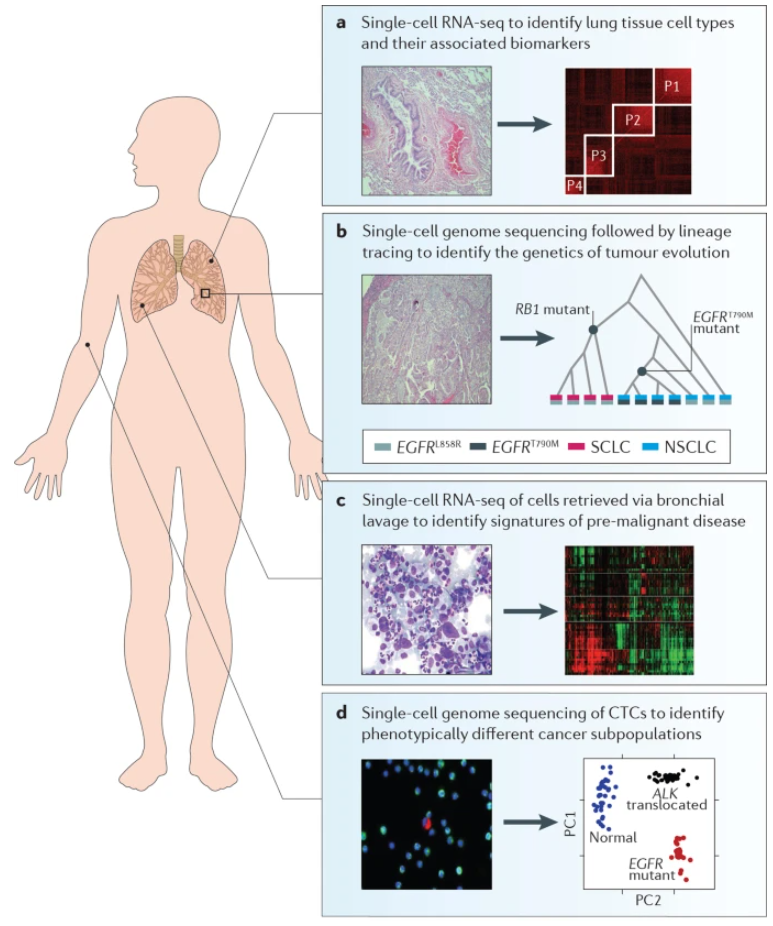
Baslan, T. et al. Nat Rev Cancer. 2017.
Figure 3. Single-cell Sequencing for the Decomposition of Heterogeneous Cellular Populations And the Analysis of Rare Cells in Lung Cancer
Applications
1. Single-cell Sequencing Monitors Disease Development
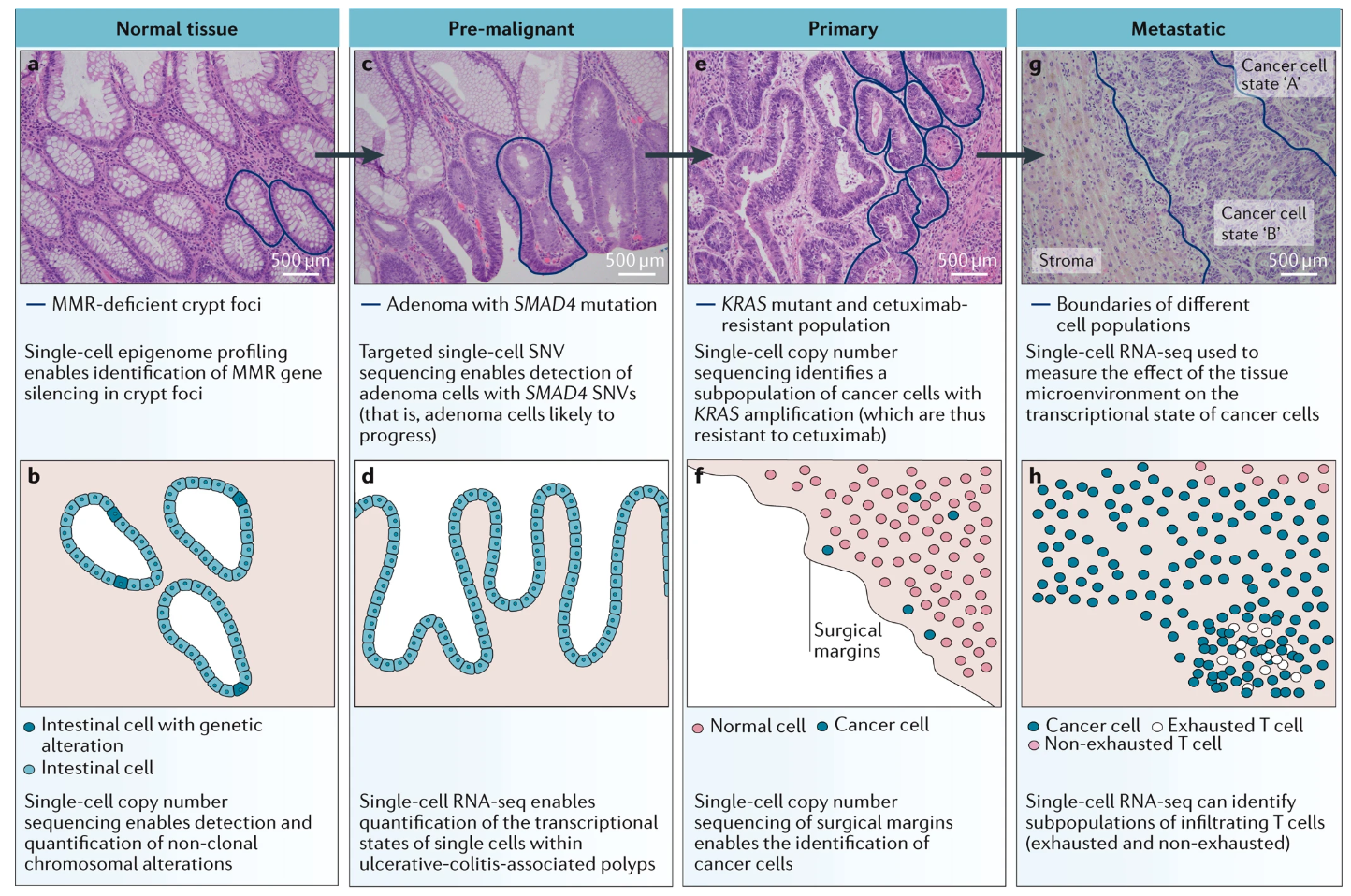
Baslan, T. et al. Nat Rev Cancer. 2017.
Figure 4. Single-cell Sequencing Can be leveraged to Study Cancer Genetics and Biology at All Stages of Disease Development
2. Single-cell Sequencing for Personalized Cancer Therapy
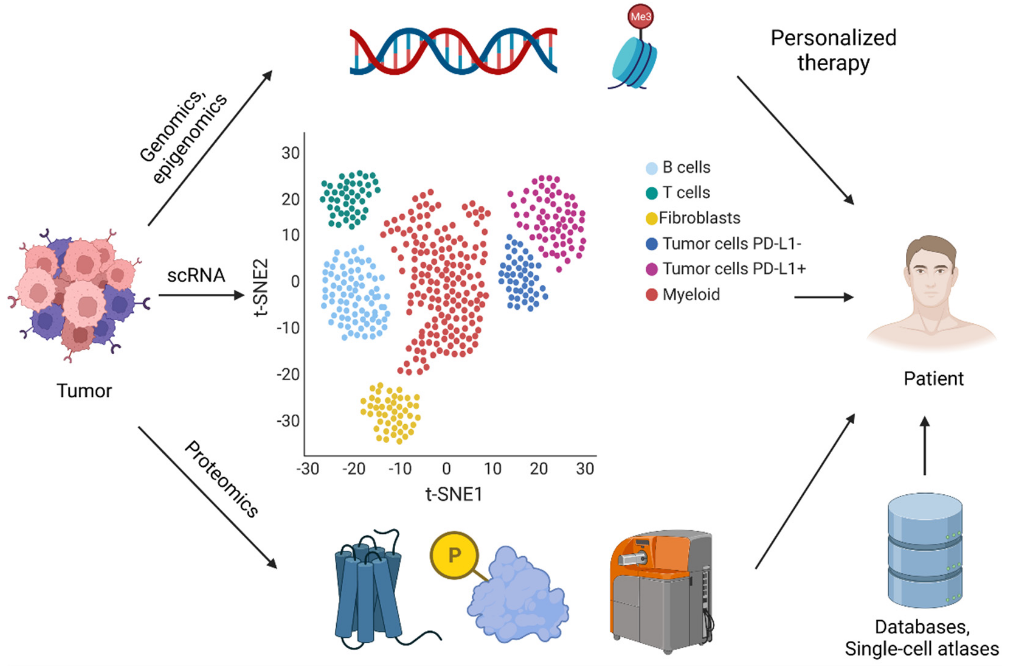
Mustachio, LM. et al. Cancers (Basel). 2022.
Figure 5. An Illustration of Using Single-cell Sequencing and Databases for Personalized Cancer Therapy
3. Single-cell Sequencing in Medical Applications
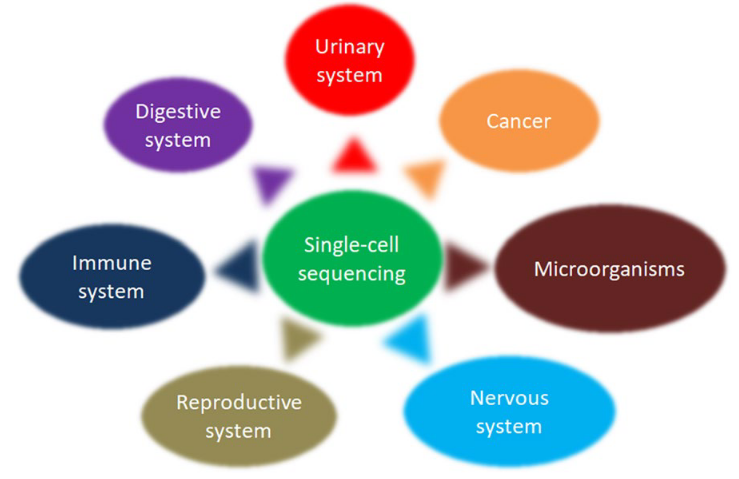
Tang, X. et al. Cell Biosci. 2019.
Figure 6. The Clinical Applications of Single-cell Sequencing in Different Fields
Single-cell sequencing service provides comprehensive solutions for precise monitoring of disease development, advancing personalized cancer therapy, and supporting medical applications such as biomarker discovery and therapeutic target identification for improved research and clinical outcomes. If you are interested in our service, please contact us freely.
Deliverables
1. Comprehensive Experimental Details
2. Materials, Instruments, and Methods
3. Relevant Liquid Chromatography and Mass Spectrometry Parameters
4. The Detailed Information of Single-cell Sequencing
5. Mass Spectrometry Image
6. Raw Data
How to order?







